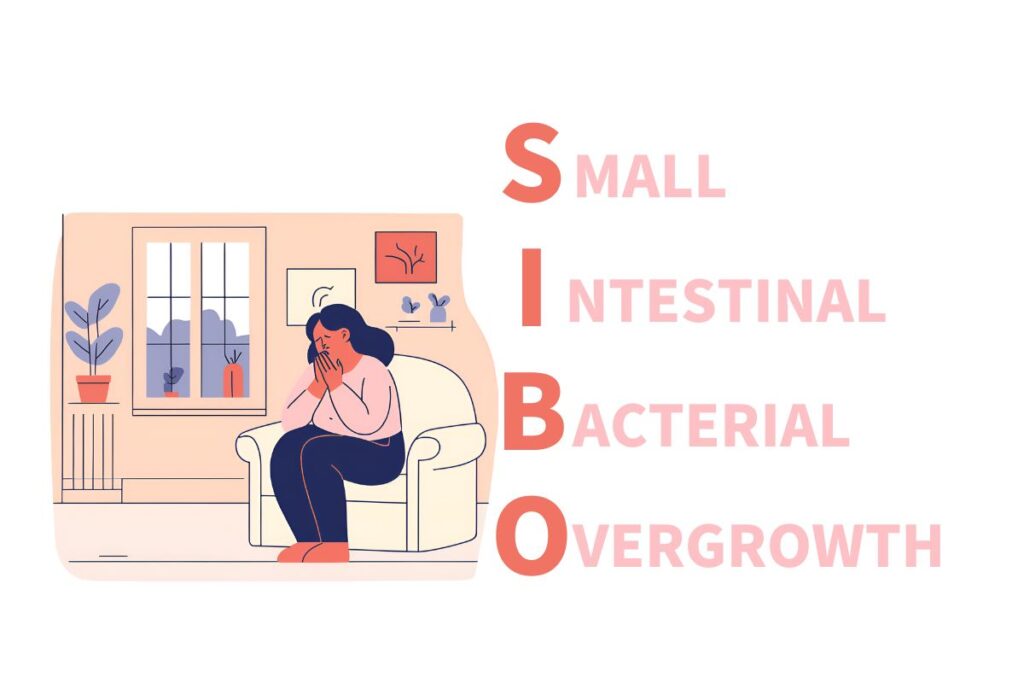Small Intestinal Bacterial Overgrowth (SIBO) is a condition that occurs when excessive bacteria grow in the small intestine, leading to digestive issues and discomfort. While the gut naturally contains bacteria, an overgrowth in the wrong place can cause significant health problems.
The Role of the Ileocecal Valve and Gut Bacteria
The large intestine and small intestine are separated by the Ileocecal Valve, which acts as a barrier between these two sections of the digestive tract.
Each section has distinct functions:
- Large Intestine: Primarily responsible for absorbing water.
- Small Intestine: Primarily responsible for absorbing nutrients, including vitamins and minerals.
Although both contain gut bacteria, the concentration varies significantly:
- The large intestine has between 10¹⁰ to 10¹² bacteria per gram.
- The small intestine has significantly fewer, with approximately 10¹ to 10⁴ bacteria per gram.
Since the small intestine is long, bacteria concentration increases as it gets closer to the large intestine. The Ileocecal Valve plays a crucial role in preventing excessive bacteria from migrating into the small intestine, helping to maintain the natural bacterial balance in the gut.
What Causes SIBO?
SIBO can develop due to various underlying factors, including:
- Impaired Gut Motility: Slow movement of food through the digestive tract can allow bacteria to accumulate in the small intestine.
- Structural Abnormalities: Conditions like adhesions, strictures, or surgical alterations (such as gastric bypass) may contribute to bacterial overgrowth.
- Low Stomach Acid: Acid helps control bacterial levels, so a deficiency can create an environment for bacteria to thrive.
- Irritable Bowel Syndrome (IBS): Studies suggest a strong link between SIBO and IBS, as both involve disrupted gut function.
- Medications: Proton pump inhibitors (PPIs) and antibiotics can alter gut bacteria balance, increasing the risk of SIBO.
Common Symptoms of SIBO
SIBO symptoms vary but typically include:
- Bloating and Gas: Due to bacterial fermentation of carbohydrates.
- Abdominal Pain and Cramping: Often linked to food intake.
- Diarrhea or Constipation: Depending on the type of bacteria present.
- Nutrient Deficiencies: Malabsorption of key vitamins and minerals, such as B12, iron, and fat-soluble vitamins.
- Fatigue and Brain Fog: Likely due to nutrient deficiencies and gut inflammation.
Diagnosing SIBO
SIBO is diagnosed using a breath test, which measures hydrogen and methane gas levels after consuming a sugar solution. Elevated gas levels indicate bacterial fermentation in the small intestine.
Treatment Options for SIBO
Managing SIBO requires a combination of dietary adjustments, medication, and lifestyle changes.
- Antibiotic or Herbal Therapy
- Rifaximin is a commonly prescribed antibiotic that targets bacterial overgrowth.
- Herbal antimicrobials (e.g., oregano oil, berberine) may be an alternative approach.
- Dietary Changes
- The Low FODMAP Diet reduces fermentable carbohydrates that fuel bacterial growth.
- Naturopathic Approaches
- Herbal Antimicrobials: Garlic, berberine, and goldenseal are known to help control bacterial overgrowth.
- Gut Healing Protocols: Incorporating bone broth, L-glutamine, or aloe vera to restore the intestinal lining.
- Probiotics and Prebiotics: Specific strains Lactobacillus spp. can help balance gut flora.
- Stress Management: Practices such as yoga, meditation, and acupuncture can improve gut-brain communication.
- Addressing Underlying Conditions
- Treating factors like IBS, low stomach acid, or structural abnormalities can reduce the risk of recurrence.
START your journey
Finding out your trigger of your gut symptoms and start your health journey with me.



